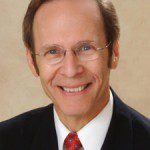 Nazi Germany had the best physicians and scientists in the world, yet those healers became killers as the Third Reich sought to create a master race and end life for those people it deemed unworthy because of disability, disease or genetic makeup. How can medical students and educators of the 21st century understand the horrors of the Holocaust to examine their own beliefs and morals?
Nazi Germany had the best physicians and scientists in the world, yet those healers became killers as the Third Reich sought to create a master race and end life for those people it deemed unworthy because of disability, disease or genetic makeup. How can medical students and educators of the 21st century understand the horrors of the Holocaust to examine their own beliefs and morals?
Dr. Sheldon Rubenfeld, a professor of medicine, endocrinologist, author and Holocaust expert, posed those questions to UCF faculty and students at a seminar January 29. As founding chairman of the Center for Medicine After the Holocaust, Dr. Rubenfeld said it’s easy for today’s healthcare professionals to say that the practice of medicine in Nazi Germany could never happen again. But they may be wrong, he said.
He explained that most physicians who participated in the Holocaust carried out the medical atrocities willingly. They sterilized 400,000 German citizens involuntarily, euthanized 200,000 German children and adults, designed gas chambers for the euthanasia programs and then supervised their use in concentration campus. Eugenics, or the science of improving human populations by controlled breeding to encourage desirable heritable characteristics and discourage undesirable ones, was widely practiced for decades before Hitler came to power in 1933. Germany was in a desperate depression and physicians were paid handsomely by the Nazi Regime. Influential academic physicians, who were promoted when their Jewish colleagues were dismissed, felt it was morally appropriate to ask who should be healed, whose life was not worth saving and how they could use biology and genetics to improve their people.
“It’s easy to say, ‘Because I’m not a Nazi, I’m not capable of this kind of behavior. But the Nazi doctors were the best in the world and they went along with these practices willingly. They went along with the national government’s use of biological principals to further its aims,” he said.
Dr. Rubenfeld believes medical students and educators need to engage in medical ethics discussions of the Holocaust so they can come “face to face with their own beliefs.”
In his 36 years of practice, Dr. Rubenfeld said he “dealt with ethical issues every day with almost every patient.” And he posed some of those ethical dilemmas to students and faculty at UCF:
- A family comes to your clinic and says they don’t believe in vaccinations. They refuse to have their child immunized. As a physician, you know this puts your patient at risk. Do you still agree to treat the child?
- You are making rounds at the hospital and find a 100-year-old patient with Alzheimer’s disease who is suffering greatly from gangrene of the leg that will take her life. She is fed through a feeding tube, has been disoriented and unresponsive for years in a nursing home, and has no family. Should you euthanize her?
- You deliver a child with massive physical and mental disabilities. What do you say to the mother who wishes the child was dead, thoughts similar to those you yourself may have? Do you perform lifesaving actions on the child?
Ethical dilemmas arise in everyday encounters much more often than in life or death situations, Dr. Rubenfeld said. Is it OK to accept free drug samples from pharmaceutical companies if you give them to low-income patients who otherwise couldn’t afford the drug? Do you make your other patients wait when an important patient arrives late and demands to be seen immediately?
Dr. Rubenfeld said one of his reasons for lecturing on ethics is that most medical schools teach a great deal more science than humanities. While the science taught to students today will likely be vastly different in five years, humanities, morality, ethics and religion “change much more slowly than science,” he said. And that’s why he believes more of the medical school curriculum should include ethical decision-making and moral problem-solving as well as evidence-based medicine.
“The problem for medical schools is that it’s easy to test scientific knowledge,” he said. “The humanities, not so much.”
As a new medical school with an integrated curriculum, UCF is in a unique position to change medical education and how students learn, understand and make ethical decisions, he said. “We have the ability to learn from the Holocaust and understand our own feelings about what our medical colleagues did, if we have the courage to face them,” he said. “As a new medical school, UCF is in a unique position. Your faculty is open to looking at the curriculum and changing it to meet the needs of today’s physicians and to struggle with the answers to the tough questions that need to be asked.”